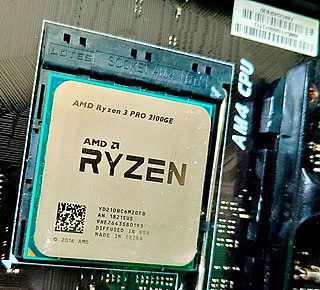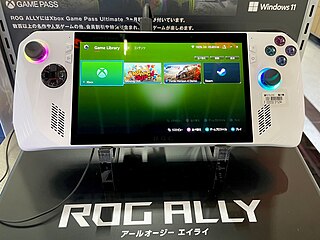Related Research Articles

Advanced Micro Devices, Inc. (AMD) is an American multinational corporation and fabless semiconductor company based in Santa Clara, California, that designs, develops, and sells computer processors and related technologies for business and consumer markets.

Windows IoT, short for Windows Internet of Things and formerly known as Windows Embedded, is a family of operating systems from Microsoft designed for use in embedded systems. Microsoft has three different subfamilies of operating systems for embedded devices targeting a wide market, ranging from small-footprint, real-time devices to point of sale (POS) devices like kiosks. Windows Embedded operating systems are available to original equipment manufacturers (OEMs), who make it available to end users preloaded with their hardware, in addition to volume license customers in some cases.
AMD PowerPlay is the brand name for a set of technologies for the reduction of the energy consumption implemented in several of AMD's graphics processing units and APUs supported by their proprietary graphics device driver "Catalyst". AMD PowerPlay is also implemented into ATI/AMD chipsets which integrated graphics and into AMD's Imageon handheld chipset, that was sold to Qualcomm in 2008.

Imageon was a series of media coprocessors and mobile chipsets produced by ATI in 2002–2008, providing graphics acceleration and other multimedia features for handheld devices such as mobile phones and Personal Digital Assistants (PDAs). AMD later sold the Imageon mobile handheld graphics division to Qualcomm in 2009, where it was used exclusively inside their Snapdragon SoC processors under the Adreno brand name.
Zen is a family of computer processor microarchitectures from AMD, first launched in February 2017 with the first generation of its Ryzen CPUs. It is used in Ryzen, Ryzen Threadripper, and Epyc (server).

Zen is the first iteration in the Zen family of computer processor microarchitectures from AMD. It was first used with their Ryzen series of CPUs in February 2017. The first Zen-based preview system was demonstrated at E3 2016, and first substantially detailed at an event hosted a block away from the Intel Developer Forum 2016. The first Zen-based CPUs, codenamed "Summit Ridge", reached the market in early March 2017, Zen-derived Epyc server processors launched in June 2017 and Zen-based APUs arrived in November 2017.

Ryzen is a brand of multi-core x86-64 microprocessors designed and marketed by Advanced Micro Devices (AMD) for desktop, mobile, server, and embedded platforms based on the Zen microarchitecture. It consists of central processing units (CPUs) marketed for mainstream, enthusiast, server, and workstation segments and accelerated processing units (APUs) marketed for mainstream and entry-level segments and embedded systems applications.
The Radeon RX Vega series is a series of graphics processors developed by AMD. These GPUs use the Graphics Core Next (GCN) 5th generation architecture, codenamed Vega, and are manufactured on 14 nm FinFET technology, developed by Samsung Electronics and licensed to GlobalFoundries. The series consists of desktop graphics cards and APUs aimed at desktops, mobile devices, and embedded applications.

RDNA is a graphics processing unit (GPU) microarchitecture and accompanying instruction set architecture developed by AMD. It is the successor to their Graphics Core Next (GCN) microarchitecture/instruction set. The first product lineup featuring RDNA was the Radeon RX 5000 series of video cards, launched on July 7, 2019. The architecture is also used in mobile products. It is manufactured and fabricated with TSMC's N7 FinFET graphics chips used in the Navi series of AMD Radeon graphics cards.

Zen 4 is the name for a CPU microarchitecture designed by AMD, released on September 27, 2022. It is the successor to Zen 3 and uses TSMC's N6 process for I/O dies, N5 process for CCDs, and N4 process for APUs. Zen 4 powers Ryzen 7000 performance desktop processors, Ryzen 8000G series mainstream desktop APUs, and Ryzen Threadripper 7000 series HEDT and workstation processors. It is also used in extreme mobile processors, thin & light mobile processors, as well as EPYC 8004/9004 server processors.

Zen 3 is the name for a CPU microarchitecture by AMD, released on November 5, 2020. It is the successor to Zen 2 and uses TSMC's 7 nm process for the chiplets and GlobalFoundries's 14 nm process for the I/O die on the server chips and 12 nm for desktop chips. Zen 3 powers Ryzen 5000 mainstream desktop processors and Epyc server processors. Zen 3 is supported on motherboards with 500 series chipsets; 400 series boards also saw support on select B450 / X470 motherboards with certain BIOSes. Zen 3 is the last microarchitecture before AMD switched to DDR5 memory and new sockets, which are AM5 for the desktop "Ryzen" chips alongside SP5 and SP6 for the EPYC server platform and sTRX8. According to AMD, Zen 3 has a 19% higher instructions per cycle (IPC) on average than Zen 2.

The GPD Win Max is a Windows-based palmtop computer manufactured by Gamepad Digital (GPD). It is the successor to the GPD Win 2, and was crowdfunded, like its predecessor. Announced in the first quarter of 2020, the crowdfunding campaign was launched on Indiegogo on May 18, 2020, priced at $779. The campaign concluded on July 1, 2020 with more than 3,500 backers having contributed more than $2.8 million dollars in total.

Socket AM5 is a zero insertion force flip-chip land grid array (LGA) CPU socket designed by AMD that is used for AMD Ryzen microprocessors starting with the Zen 4 microarchitecture. AM5 was launched in September 2022 and is the successor to AM4.

Ayaneo is a Chinese brand of handheld gaming computers and mini PCs using the Microsoft Windows operating system and AMD Ryzen processors.
The Ayaneo 2 is a handheld gaming computer developed by Ayaneo and released in December 2022. The console uses a Zen 3 processor. It can play PC games on the Windows 11 operating system. It competes against Valve's Steam Deck and Asus ROG Ally.

The Asus ROG Ally is a handheld gaming computer developed and manufactured by Asus as part of their Republic of Gamers (ROG) brand. Released on June 13, 2023, the device competes with Valve's Steam Deck. The ROG Ally runs the Windows 11 operating system and uses an AMD Zen 4 processor called the AMD Z1 and Z1 Extreme. In addition to handheld use, the ROG Ally can be connected to a TV or monitor through a docking station or a dongle and be used like a desktop computer or home video game console.
The Lenovo Legion Go is a handheld gaming computer developed by Lenovo and released in October 2023. The device uses Windows 11 with a Lenovo Space game launcher.
References
- ↑ Linder, Brad (October 18, 2024). "TECNO Pocket Go hits Kickstarter: Handheld gaming PC with a wearable display". Liliputing.
- ↑ https://thegadgetflow.com/product/tecno-pocket-go-ar-gaming-handheld
- ↑ "TECNO's Pocket Go Windows AR system set wants to be a gaming PC you can wear (Update)". Android Authority. September 6, 2024.
- ↑ "I'm Excited about this Controller that Hides a Handheld Console". nextpit. September 10, 2024.
- ↑ "TECNO Pocket Go Wins Global Product Technology Innovation Award 2024 at IFA 2024". www.prnewswire.co.uk.
- ↑ "Tecno unveils Pocket Go gaming handheld with AMD Ryzen 7 8840HS and AR glasses - VideoCardz.com".